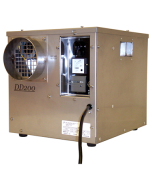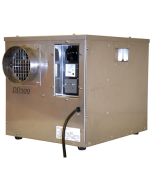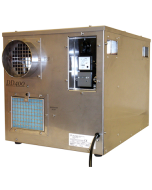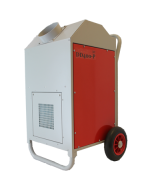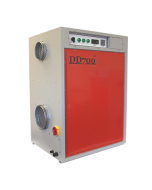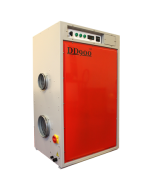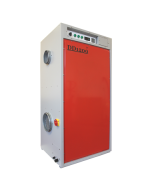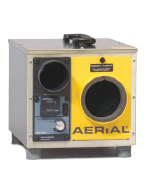Cold Store Humidity Control for Meat Industry
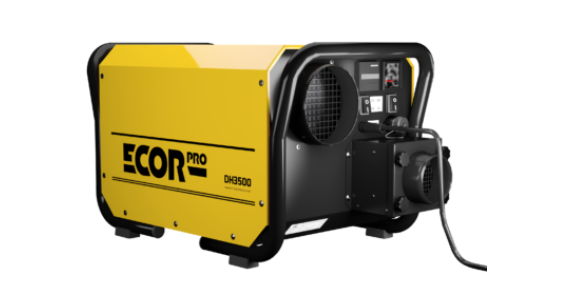
Cold Store Humidity Control - Background
In the meat business, carcasses are usually hung for a period of time before the meat is cut and further processed. The conditions inside the cold storage facilities in which the carcasses are aged is really important. Temperature is obviously important to enable the meat to develop its flavour over time and to prevent the meat perishing, but so to is the humidity level in the store.
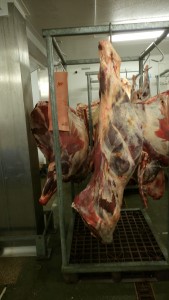
Meat that has been stored in conditions which are too humid will become wet and sticky which not only makes it unpleasant to work with but also creates an unnessesary level of waste material, which is time-consuming to separate from the meat. If there is surface wetness on the meat for a prolonged period of time, such as during the maturing process in the cold store, then it can taint the meat and give it a musty flavour. A steady flow of warm fresh carcases into the store inevitably adds to the humidity level of the air in the cold store and left unchecked high humidity levels can be a real issue in cold stores for maturing and for curing meat.
Cold Store Humidity Control - Traditional Approach
One common solution is to use silica absorbent crystals. Whilst this is undoubtably a simple solution, it is also an expensive solution with an ongoing high cost burden to replacing the desiccant crystals, not to mention the regular hassle of actually changing the packets of desiccant silica crystals. A facility with a small cold store could easily be paying £60 - £150 per month for replacement absorbent crystals.
The other significant problem with the silica crystals approach is the lack of control. There is no control to prevent the silica packets from not removing enough humidity and conversely, nothing to prevent them removing too much humidity. And do silica crystals react to variable conditions caused by the access door being opened and closed and warm carcasses being put in, or cold ones being taken out of the cold store? The short answer ...no.
Cold Store Humidity Control - Case Study
One company in the North West, Westgate Frozen Foods, has been using a small desiccant dehumidifier for their cold store humidity control for several years. Their cold

store humidity control system sits unobtrusively outside the cold store, supplying dehumidified air into the store. It works on a closed loop so that the inlet air to the desiccant dehumidifier is drawn from inside the cold store. The beauty of the system is that the humidity level can be preset so that the dehumidifier works to achieve the preset value, so that the cold store is neither too humid or too dry.
As much of their beef can be hung for up to 4 weeks rather than a few days, the effect of the cold store being too dry is a marked reduction in carcass weight through product drying. Over the time that they have been using the current system Westgate Frozen Foods have carried out a certain amount of 'test and adjust' on the humidistat setting and now believe that presetting the desiccant dehumidifiers' humidisat to 72% RH is ideal. At this humidity, and when stored at 0-1°C, the meat is cold, yet dry and not sticky to the touch, but does not cause the meat to dry out over the maturing process. Once matured the meat is easy to work and has only minimal surface waste material.
Although Westgate found that 72% RH is right for them, it does not follow that this setting would suit other cold stores holding meat. The ideal humidity will depend on the size of the cuts of meat being hung, the residence time for the meat and the amount of staff 'traffic' moving into and out of the cold store. Although we can advise on a suitable a suitable size desiccant dehumidifier and initial setting for the unit, ultimately for each application the ideal setting will be discovered with small adjustments over time.
The humidity from the cold store that is removed from the air, is captured on a rotor made with a matrix of silica gel covered flutes which rotates inside the dehumidifier. As it turns it passes through a regeneration sector through which a separate heated air flow is passed, which dries the silica. The exhaust airflow from the desiccant dehumidifier is warm and humid.
At Westgate Frozen Foods the running cost of the desiccant dehumidifier is significantly less than the cost of replacement silica crystals which was the basis of their previous cold store humidity control method, and they reckon that the payback of the new system was measurable in months rather than years. But the real benefit to Westgate Frozen Foods of the desiccant dehumidifier is the easy and accurate control of the cold store humidity and the sheer lack of hassle in keeping the carcasses in prime condition as they mature.
The cold store at Westgate is relatively small, and this together with the operating requirements called for a small desiccant drier. However cold store operations come in all shapes and sizes, and often much larger dryers are required. We have the ability to supply units capable of handling up to 100000m3/hr, although so far we have not found an application big enough to warrant this size of dryer (here's hoping!). More likely the dryers used for cold store humidity control, will be in the range 100 - 1000 m3hr.
Call us if you need humidity control for your cold store - 01729 824108

